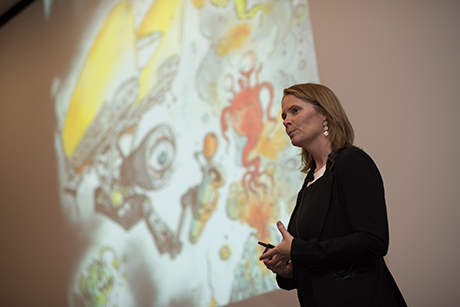Julie Huber Presents “Planet Microbe” at UChicago 125th Anniversary Event

 Julie Huber speaks at the William Eckhardt Research Center last month at the University of Chicago. Credit: Rob Hart
Julie Huber speaks at the William Eckhardt Research Center last month at the University of Chicago. Credit: Rob HartLeadership and scientists from the University of Chicago and its three affiliated laboratories — MBL, Argonne National Laboratory, and Fermi National Accelerator Laboratory – gathered in Chicago last month to celebrate the past, present, and future of these collaborative partnerships, as well as the University’s 125th anniversary year. (Please see University of Chicago news story about the event here.)
As part of the celebration, Julie Huber, associate scientist and associate director of the MBL’s Josephine Bay Paul Center, gave one of four “Short Talks on Groundbreaking Research” (see video here). Huber and her colleagues are interested in large, cross-disciplinary questions, such as “How does life spread across the planet?” and “How do life and its environment co-evolve?” In that context, her lab is focused on the smallest and most abundant life form on Earth, the microbes.
Huber described the “stunning diversification” of microbial forms, which inhabit almost every niche on the planet. “What we do very well in Woods Hole is study the ocean,” she said, and her lab is exploring the mostly unknown realm of microbes living in deep-sea volcanic systems and beneath the seafloor. In these extreme, high-pressure environments, microbes have evolved novel strategies to survive, such as harvesting energy not from the sun but from the chemical energy of water-rock reactions.
Describing extreme marine microbes “may seem like very strange science, but the implications and applications are wide-ranging,” Huber said, including for research on how life began, the search for extraterrestrial life, and for discovery and development of new natural products ranging from anti-cancer drugs to biofuels.
“We have a lot left of our Planet Microbe to explore,” she said.